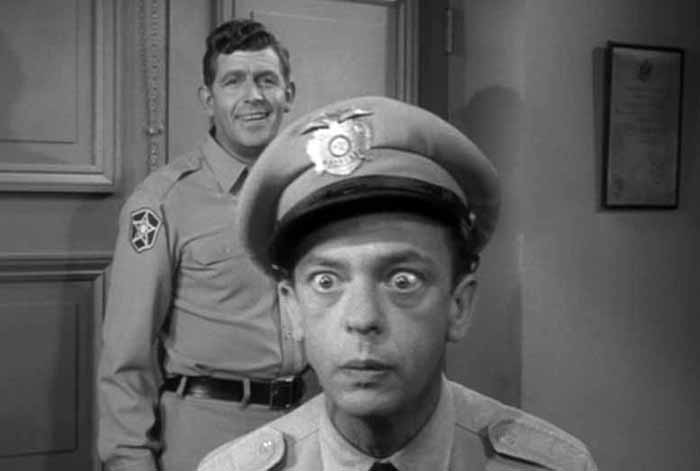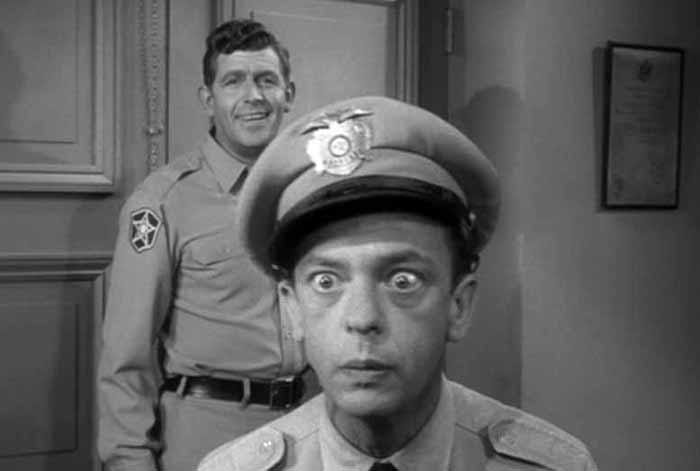
Barney Fife (played by Don Knotts) is one of the funniest characters in American television history. As the deputy sheriff of Mayberry, Barney is known for his over-enthusiasm, misplaced confidence, and hilarious mistakes. However, behind the funny moments, this character also contains many profound meanings about people and life.
1. Elements that make Barney Fife funny
(1) Over-enthusiasm and misplaced confidence
Barney always believes that he is an excellent police officer, but in reality, he often complicates situations instead of solving problems.
In the episode “Barney’s First Car”, Barney buys a car from a sweet old lady who he thinks is trustworthy. In the end, the car turns out to be a piece of scrap metal, making Barney realize that he has been duped – a great lesson in not being too quick to trust people.
In “The Big House,” Barney is assigned to guard two prisoners, but instead of being professional, he creates his own bizarre rules and eventually lets them escape.
The humor here comes from the contrast – Barney believes he is the smart one, but in reality he is always the one causing trouble. This is a form of slapstick comedy combined with an exaggerated personality.
(2) Classic mistakes with a gun and a single bullet
Barney is a cop, but Andy only allows him to carry one bullet – and he often drops or misuses it.
One of the funniest scenes is when Barney accidentally fires his gun in the police station.
In another episode, he tries to quickly load a bullet into his gun to appear professional but drops it on the ground, startling himself and everyone around him.
This is a form of physical comedy, combined with an emphasis on the character’s weaknesses. Andy giving Barney only one bullet is a metaphor for his inability to fully trust Barney’s abilities – but also shows Andy’s concern for his friend.
(3) Barney and “Criminal Police” Philosophies
Barney always tries to act like a professional police officer, but often relies on strange rules or outdated manuals.
In “Citizen’s Arrest,” Barney insists on enforcing the law to the point of forcing himself to pay a fine.
In “Barney and the Cave Rescue,” he tries to organize a major rescue operation for Andy, but it turns out that Andy is just stuck in a small cave and can get out on his own.
The humor here comes from the conflict between Barney’s desire to control and a reality that is completely beyond his control. This reflects the reality of life: sometimes, people who follow rules or principles too much become the ones who cause the most trouble.
2. Why is the character Barney Fife so popular?
The archetype of “trying but always failing”: The character Barney represents people who always want to prove themselves but are not capable enough. This creates empathy, because everyone has experienced the feeling of wanting to do something really well but making mistakes.
The perfect combination of personality and acting: Don Knotts not only has a funny face but also uses body language excellently – from eyes, gestures to dramatic voice.
Barney is not only a funny character, but also brings emotions: Despite his many mistakes, he is still a loyal and kind person. Andy understands that, so even though Barney has bothered him many times, Andy always protects and supports him.
3. Barney Fife’s Influence on Popular Culture
One of the Greatest Comedians: Barney Fife is regularly listed as one of the funniest characters on American television.
Inspiration for many future comedic characters: Many comedic police characters in sitcoms such as Dwight Schrute (The Office) and Barney Stinson (How I Met Your Mother) also have a part of Barney Fife’s personality – people who are overconfident but often make jokes.
Famous Quotes: Some of Barney’s lines have become cultural icons, such as:
“Nip it in the bud!”
“You gotta be firm, Andy!”
Barney Fife’s comedic moments are not just jokes but also reflect aspects of human nature: over-enthusiasm, misplaced confidence, and the desire for recognition. Thanks to the combination of excellent writing and Don Knotts’s genius acting, Barney Fife has become an immortal icon in television history.

